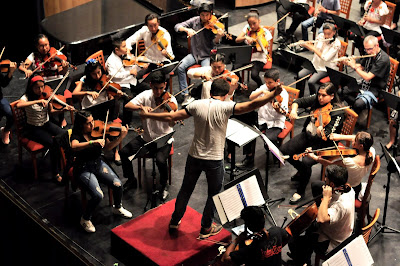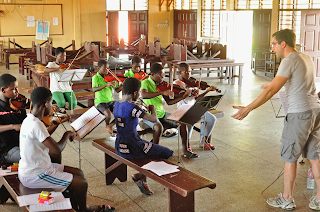Oaxacan Sounds
 |
| The Orquesta Juvenil de Santa Cecilia rehearsing in the Teatro Macedonio Alcalá in Oaxaca. |
“But we have already killed the chickens!” This was the matter-of-life-and-death reason I was given to attend a dinner in Mexico, when I tried to politely turn down the invitation, not wanting to be a burden. The inviting family, living in a colonia located in the foot of the city's landfill, 45 minutes away from the city, meant every word: They had indeed just killed two of their chickens, and they were already preparing a homemade meal. I experienced it many times—the pressured and urgent invitation, which only came directly from the heart of the locals—as a loving gesture of hospitality from a culture that is so rich in giving, yet so limited in having.
I was in Oaxaca, Mexico for two weeks, working with children who, despite the extreme adversity they face in life,they choose music to express themselves and share with the world something powerful and beautiful. The reason I was there in September was to help the final stages of preparation before two performances—one in their community and one in the city of Oaxaca. In this community, being situated so close to the landfill, apart from the usual gang-related violence, the poverty most of the people face is unbelievable. I wish I could find words to convey the pride I feel when I go in the classroom and start rehearsing Beethoven and Tchaikovsky with them. This was a selection of works so difficult that could have been played by professional musicians, yet these children came every morning and afternoon to rehearse, not because they had to, but because they wanted to. They came because they wanted to share with the world that whom they are today will not define whom they will be tomorrow.
======
Both concerts were a huge success. Granted there is still a long way to go musically; the bigger goal was to use music as an invitation for something greater. The success the students experienced was not a result of an external “gift” but that of their own hard work. There was a great emotional improvement, and many students were trying very hard to help others, to keep the focus in the group, and to contribute to the success of the orchestra. There was a magical sense of accomplishment when the performances were completed, and a sense of greater self-esteem, self-worth, and self-confidence were evident among the Mexican musicians.
After the performance, a few of the young musicians broke down in tears while congratulating each other. I suppose the feeling of achievement and success was overwhelming, allowing them to open up and feel, even briefly, important, and not the “children from the garbage dump” as they are often known.

Comments
Post a Comment